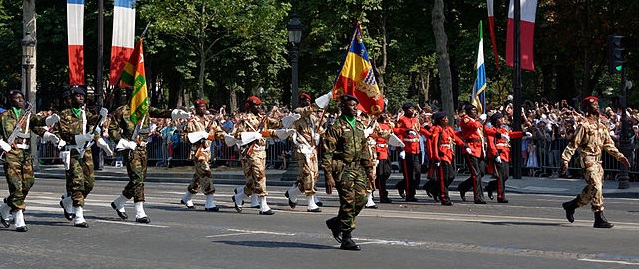SSR Resource Centre Blog Contributor Yonmon Tchinsala uses Chad to demonstrate the pitfalls of militarisation without an appropriate focus on promoting positive peace when managing state security forces.
Recurring security threats have led many countries in Africa to resort to militarism – the belief that nations need large powerful military forces to ensure their safety, security and the protection of their interests. For these countries, safety and security have often meant buying more weaponry, enlisting more active duty soldiers, whether trained or untrained, and the sidelining of opponents. Eritrea, DRC, CAR, Chad, the Congo, Sudan, and South Sudan are, among others, a perfect illustration of this mindset.
This article uses Chad as a case study to argue that the paradigm of security as militarism without a deliberate pursuit of positive peace to ensure the safety and security of persons can become counterproductive in the current environment of the growing threat of Islamic insurgency in Africa. It then advocates for a security paradigm shift that must be more attentive to, and respectful of, human rights.
The West African country of Chad has, for most of its formal existence since its independence in 1960, been a theater of a series of armed rebellions and internecine wars that sometimes involved the mingling of foreign powers such as Sudan, Libya, and France. The exposure of Chad to constant instability caused by wars and armed incursions has led scholars to qualify Chad as the “epitome of a failed state in Africa.”[i] Sadder still, literature indicates that armed violence has become an official occupation for the military in Chad.
The arrival to power in 1990 of the country’s current president, Idriss Deby, paved the way to much needed stability and created the conditions for some economic development facilitated by the World Bank and the IMF – for instance, it allowed the development of the oil project. With the petro-dollar windfall, the country’s president, Idriss Deby, decided to build a large army, many of whom are child soldiers, headed by more than 500 generals, hailing mostly from his own ethnic group, to address the regular rebel incursions in the country. Indeed, this effort actually paid off as it enabled the former rebel leader to quash the different armed rebellions across the country and consolidate his grip on power.
Soon after this victory, however, efforts to reform this largely untrained shoot-and-kill army failed and the bulk of them were diverted into the country’s different security institutions such as the police force, the gendarmerie, the nomad guards, and even customs, often with no further training on how to interact with the civilian population. The result was catastrophic. Across the country, the army quickly resorted to killing, looting, and terrorizing of the civilian population. Unfortunately, little of these atrocities filter into the media due to the constant crackdown on the press by the repressive ruling military regime.
In fact, if statistics are any indication, in terms of levels of civilian safety and security, Chad ranks 141st out of the 142 countries studied in 2013 by the Legatum Institute. This puts Chad far behind war-torn Afghanistan, which ranks 139th in the same safety and security index. Similarly, the 2013 Mo Ibrahim Index of African Governance places it 46th out of 52 in terms of safety and rule of law and, 48th in term of human rights.
The current crisis in the Central African Republic (CAR) is further drawing a curtain on the brutality of Chad’s military. As an important part of the 3700-strong MISCA international peacekeeping force, Chad’s army is accused of colluding with the Seleka, the CAR’s marauding ex-rebels, who are plunging the country into a genocidal situation. Clearly, the Chadian forces that have proved effective in hunting down the Islamic militants in Mali alongside the French forces are ill-prepared to work as a policing force in peacekeeping operations.
There are several lessons we can learn from Chad’s example. First, security and safety are not just about numbers and military hardware to protect countries from aggression, whether from within or without. More than this, it is about the appropriate level of training needed to relate to, interact with, and protect and serve the vulnerable civilian population in times of war, as well as in times of peace. Second, countries that desire peace must do more than promote militarism. In fact, empirical studies repeatedly indicate that the aggressive use of violence rarely results in peaceful outcomes. Finally, as African nations are thinking about setting up rapid intervention forces to address growing tensions in the region, there is a need to emphasize the appropriate human rights training and the primacy of law in armed conflicts for participating forces, so they are able to perform their task effectively.
[i] May, R., & Massey, S. (2000). Two steps forward, one step back: Chad’s protracted transition to democracy. Journal of Contemporary African Studies 18(1), 107-132
Tags: Chad, militarisation, peacekeeping






 Visit the Centre for
Visit the Centre for